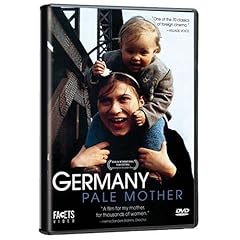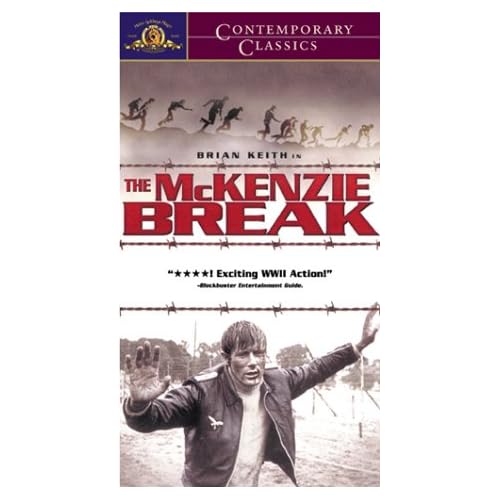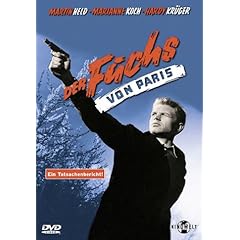 THE ONE THAT GOT AWAY,
THE ONE THAT GOT AWAY, screenplay by Howard Clewes, from the book by Kendal Burt and James Leasor; directed by Roy Baker; produced by Julian Wintle; presented by J. Arthur Rank. At the Odeon. Running time: 105 minutes.

What a great little film this is, an quite unique. Hardy Kruger is wonderful in this role (even better than he was in Flight of the Phoenix)and the story is unusual and fast paced. The best part is this is a *true* story too so it's very intriguing to know this von Werra guy was really in the German army...he was hardly a conformist like we always think "Nazi" soldiers would be.
Franz von Werra . . . . . Hardy Kruger
Army investigator . . . . . Colin Gordon
R. A. F. interrogator . . . . . Michael Goodliffe
Intelligence officer . . . . . Terrence Alexander
Commandant . . . . . Jack Cwillim
German prisoners . . . . . Harry Lockart, Robert Crewdson, George Mikell, George Roubicek, John Van Eyssen, Frederick Paeger, Richard Marner, Paul Hansard.

--------
"THE ONE THAT GOT AWAY," a well-made British film, refers to the only Nazi war prisoner of England who escaped back to Germany. Here, surely, is a heaven-sent plot for a solid suspense drama. Not only that, this J. Arthur Rank presentation, which opened yesterday at the Odeon, is a true story, the foreword reminds us. The result is a generally taut, absorbing and tingling film—a good, British job about a man who couldn't be held down.
The restrained, well-knit scenario, which Howard Clewes has based on a factual book, tells how one Franz von Werra, a young Luftwaffe hero, twice eludes his captors in the English countryside and finally in Canada. Told as a bluntly matter-of-fact escape yarn, from the fugitive's viewpoint, his dogged outwitting of various soldiers and civilians seems just fantastic enough to be true. We defy anyone, toward the end, not to root silently for the Nazi hero, excellently played by young Hardy Kruger. And hero is the only word to describe this cunning, determined fellow. Such is the pulling power of his courage—again, the only word—and that of the picture as an adventure yarn.
However, the early scenes, after Mr. Kruger's plane crashes into English hands, clearly define him as an arrogant, Nazi "glamour boy" (and a phony—half of his exploits are lies). After one interrogation encounter with a disabled British ace. Colin Gordon (a fine, thoughtful scene), the prisoner manages to bolt.
Roy Baker, the director, alertly gives mounting crescendo to the escapee's bland hoodwinking of civilians and his reappearing captors, as he almost gets a plane aloft. Finally (in custody again) hopping a train in Canada, he makes a dogged, panting river crossing into a neutral United States. (The time is 1941.) And the picture does stand firm, as a dogged account of one man's grit and determination.
However, at the cost of power, scope and stature, it is a peculiarly bloodless drama, for its content. Except for an occasional overhead rumble, the war itself seems remote. Also, is it the British way—or anybody's—to trot captives down the road for a "break" and amble them back without an immediate count? Later, too, Mr. Kruger eludes some guards at a railway station simply by loping away.
In addition to Mr. Kruger's sweatingly assured acting, the remainder of the cast is consistently good. If not a milestone, "The One That Got Away" adds up to a consistently good tingler.
From: NYTimes


 The cast does a marvelous job of fleshing out the documentary evidence to create convincing characters. Kenneth Branagh is especially chilling as SS Chief of Security Reinhard Heydrich, who uses a combination of charm and ruthless power-mongering to gain support for his plans.
The cast does a marvelous job of fleshing out the documentary evidence to create convincing characters. Kenneth Branagh is especially chilling as SS Chief of Security Reinhard Heydrich, who uses a combination of charm and ruthless power-mongering to gain support for his plans.  Colin Firth is fascinating as Wilhelm Stuckart, a lawyer who sees the brutal tactics of the SS as a threat to his own intellectualized anti-Semitism, and Stanley Tucci gives a wonderfully understated performance as Adolf Eichmann.
Colin Firth is fascinating as Wilhelm Stuckart, a lawyer who sees the brutal tactics of the SS as a threat to his own intellectualized anti-Semitism, and Stanley Tucci gives a wonderfully understated performance as Adolf Eichmann.







































